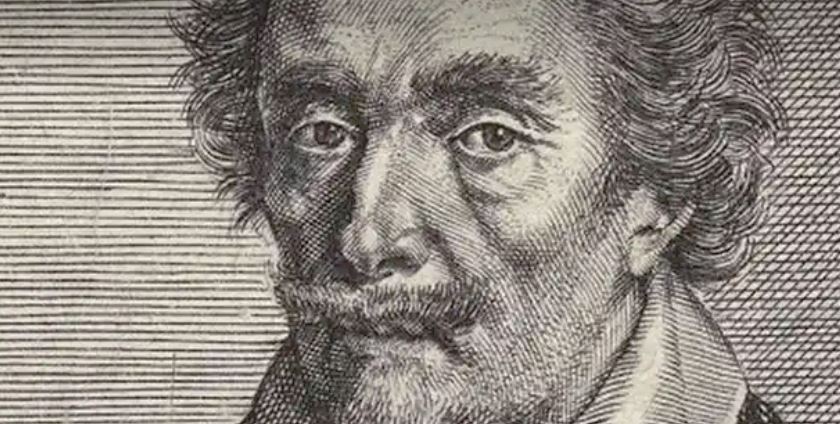Saint of the Day – 26 April – Saint Paschasius Radbertus (785–865) Monk, Abbot, Theologian – born 785 at Soissons, France and died in 865 of natural causes. St Paschasius was a Carolingian theologian and the abbot of Corbie, a monastery in Picardy founded in 657 or 660 by the queen regent Bathilde with a founding community of monks from Luxeuil Abbey. His most well-known and influential work is an exposition on the nature of the Eucharist written around 831, entitled De Corpore et Sanguine Domini.
Paschasius was an orphan left on the steps of the convent of Notre-Dame de Soissons. He was raised by the nuns there and became very fond of the abbess, Theodrara. Theodrara was sister of St Adalard of Corbie (C 751-827) and St Wala of Corbie (c 755–836), two monks (and both abbots prior to Paschasius) whom he admired greatly. At a fairly young age, Paschasius left the convent to serve as a monk under Abbot Adalard, at Corbie.
Through the abbotship of both Adalard and Wala, Paschasius focused on the monastic life, spending his time studying and teaching. When Adalard died in 826, Paschasius helped ensure Wala would become Abbot in his place. Wala’s death in 836 brought yet another abbot to Corbie, Ratramnus, who held opposing views to Paschasius on a number of ecclesiastical issues. Ratramnus wrote a refutation of Paschasius’ treatise on the Eucharist, De Corpore et Sanguine Domini, using the same title.
By 844, Paschasius himself became abbot, however he resigned his title ten years later to return to his studies . He left Corbie for the nearby monastery of St Riquier, where he lived in voluntary exile for some years. Why he resigned is unknown, however, it is likely that his actions were motivated by factional disputes within his monastic community, misunderstandings between himself and the younger monks were likely factors in his decision. He returned to Corbie late in life and resided in his old monastery until his death in 865.
St Paschasius’ body was first buried at the Church of St John in Corbie. After numerous reported miracles, the Pope ordered his remains to be removed and interred in the Church of St Peter, Corbie. He was Canonised in 1073 by Pope Gregory VII.

St Paschasius has an extensive collection of works, including the “Vitae” or Lives of St Adalbert and St Wala and many exegeses on various books of the Bible. He wrote commentaries on the Gospel of Matthew, Lamentations, a commentary on Revelations and an exposition of Psalm 45, which he dedicated to the nuns at St Mary at Soissons. De Partu Virginis, written for his friend Emma, Abbess of St Mary at Soissons and daughter of Theodrara, describes the lifestyle of nuns.  He also wrote a treatise, titled De Nativitae Sanctae Mariae, regarding the nature of the Virgin Mary and the birth of Jesus Christ. Paschasius probably wrote much more but none of it has survived through the centuries.
He also wrote a treatise, titled De Nativitae Sanctae Mariae, regarding the nature of the Virgin Mary and the birth of Jesus Christ. Paschasius probably wrote much more but none of it has survived through the centuries.
The most well-known and influential work of St Paschasius, ‘De Corpore et Sanguine Domini’ The Body and Blood of Christ (written between 831 and 833), is an exposition on the nature of the Eucharist. It was originally written as an instructional manual for the monks under his care at Corbie and is the first lengthy treatise on the Sacrament of the Eucharist in the Western world. In it, Paschasius agrees with St Ambrose (340-397) in affirming that the Eucharist contains the true, historical body of Jesus Christ.
According to Paschasius, God is truth itself and, therefore, His words and actions must be true. Christ’s proclamation at the Last Supper that the bread and wine were His body and blood must be taken literally, since God is truth. He believes that the transubstantiation of the bread and wine to be used at the Eucharist occurs literally. Only if the Eucharist is the actual body and blood of Christ can a Christian know it is salvific.
Paschasius believed that the presence of the historical blood and body of Christ allows the partaker a real union with Jesus in a direct, personal and physical union by joining a person’s flesh with Christ’s and Christ’s flesh with his. To Paschasius, the Eucharist’s transformation into the flesh and blood of Christ is possible because of the principle that God is truth, God is able to manipulate nature, as He created it.
The book was given to Charles the Bald, the Frankish king, as a present in 844, with the inclusion of a special introduction. The view Paschasius expressed in this work was met with some hostility. Ratramnus, who preceded Paschasius as Abbot of Corbie, wrote a rebuttal by the same name, by order of Charles the Bald, who did not agree with some of the views Paschasius held. Ratramnus believed that the Eucharist was strictly metaphorical, he focused more on the relationship between faith and the newly emerging science, while Paschasius believed in the miraculous.
Shortly thereafter, a third monk joined the debate, St Rabanus Maurus (c 780–856), which initiated the Carolingian Eucharist Controversy. Ultimately, however, the king accepted Paschasius’ assertion and the physical presence of Christ in the Eucharist, which had already been believed for centuries, was cemented by St Paschasius book and cleared the way for a precise understanding of Transubstantiation.

2 thoughts on “Saint of the Day – 26 April – Saint Paschasius Radbertus (785–865)”